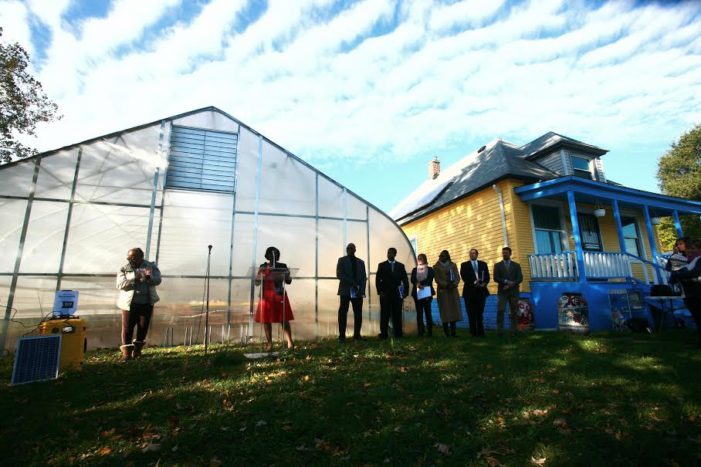At the North End Christian CDC, outside a hoophouse in Detroit’s North End, Kimberly Hill-Knott recounted the origins of the Detroit Climate Action Collaborative, or DCAC, in 2011. At the time, the dialogue surrounding sustainability was eclipsed by bigger questions about the future of the city itself.
“Bankruptcy was looming, the threat of the appointment of an emergency manager was hanging over our heads, and of course, both of those events happened,” Hill-Knott, DCAC project director, and president and CEO of Future Insight Consulting, recalled. “We asked ourselves, ‘Does it even make sense to forge ahead with developing a climate action plan?’ We concluded that we had no other choice.”
In line with Detroit’s legacy of participatory community action, the collaborative, a program of Detroiters Working for Environmental Justice, or DWEJ, soldiered on.
“We didn’t have time to wait on the Federal government,” Hill-Knott said. “We didn’t have time to wait on state government.”
Today, the collaborative’s Climate Action Plan was released to the general public.
DCAC brought together 26 businesses, community groups, universities, environmental groups, and public agencies to develop a framework to guide the development of a Detroit that is resilient in the face of more extreme temperatures and weather conditions, and a city that is greener and more equitable.

“The report has 25 specific actions that can be taken by various individuals and groups,” Hill-Knott said, urging audience members to familiarize themselves with the guide and understand what role each of them can play in improving the city. One goal includes reducing 2012 baseline greenhouse gas emissions 10 percent by 2022 and 30 percent by 2032.
Hill-Knott was joined by Dominic DiCicco, Manager of Environmental Policy and Fuel Quality for Ford Motor Company, climatologist Omar Gates, City of Detroit Director of Sustainability Joel Howrani-Heeres, and DWEJ Executive Director Guy Williams, as well as Roslyn Ogburn, a DCAC community organizer.
Dr. Natalie Sampson, a professor of public health at the University of Michigan, also spoke.
“The prevalence of asthma is 29 percent higher in the city of Detroit than in the rest of Michigan,” she said. “[Detroit has] three times the amounts of hospitalizations for asthma than in the state of Michigan… This is just one health issue, and we know that there are more.”
Asked whether she had any pilot projects in mind, Kimberly Hill-Knott said she looks forward to working with the city’s new director of sustainability, Joel Howrani-Heeres, and pointed toward the completion of successful projects like the Detroit Smart Neighborhoods pilot, which trained Detroit Housing Commission residents in energy retrofits and residential energy modeling.
DWEJ organized the trainings with advisor and instructor Kevin McNeely, and subsequently partnered with Southwest Housing Solutions (and, incidentally, the author of this article) to work on a few homes in the Marygrove neighborhood. DWEJ Executive Director Guy Williams explained how five of those trainees went on to work with Detroit builder Brian Duell, with whom DWEJ has partnered on a construction company focused on energy and sustainability.
Williams saw the training program as having natural synergy, one where Detroiters are put to work improving their own community.
“If they could become employed in a trade that’s also making the community and housing healthier, there would be multiple wins,” he said.
Such inventive opportunities pairing economic development with sustainable innovation are critical for the success of the Climate Action Plan, and Hill-Knott looks forward to collaborating with the City of Detroit for future implementation.
“We’ve got all of these wonderful recommendations and goals, it’s just a matter of getting everybody together,” she said.
DWEJ, founded in 1994, cites itself as the oldest environmental justice organization in the state of Michigan.
Lead image: DCAC supporters and partners work at the North End Christian CDC hoophouse on Goodwin St. in Detroit’s North End


